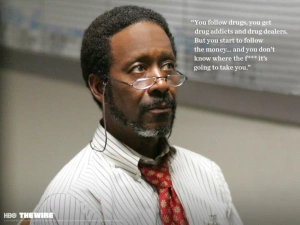Tagged: conservative
Follow the Money: What I Learned from “The Wire”
When I heard the 2016 TESOL Convention was to be held in Baltimore my first thought was, “Wow, they are holding it in the hometown of baseball legend Harold Baines! Nice.”

A pure hitter.
My next thought was, “Yeah, cool, but Seattle sounds like a better location for me” (partially because I have never been to the Pacific Northwest and because I already half-promised Laura I’d try to make it in 2017).
My third thought was, “Hey, Baltimore is the home of The Wire.” I will always remember when my brother (a big Harold Baines fan, by the way and for the record) sat me down and insisted I watch the Wire with him (for what was his 3rd run through). I was immediately engrossed and I’ve always appreciated him insisting on this and for teaching me the true meaning of binge-watching. This is actually not the first time The Wire has been mentioned on this blog. A previous post entitled, “The Wire, Twitter, and Reflective Practice” mentioned my love of the show. In case you are curious, my cousin, Peter Griffin, accurately summed up my views on the best TV shows ever (with apologies to Seinfeld.)
My favorite character on The Wire was probably Lester Freamon (with apologies to The Bunk). One of the reasons I liked Lester so much was because he did his job as best he could without paying much mind to the empty suits above him (spoiler alert: he paid some costs for this). I also appreciated his dogged pursuit of criminals through atypical means all the while proving himself not to be a “hump.” I feel there is a lot one could take away from Lester’s words and actions.

Natural police.
I think Lester proved some of his wisdom here when he waxed poetic about life to Jimmy McNutty, saying, “A life. A life, Jimmy, you know what that is? It’s the shit that happens while you’re waiting for moments that never come” and telling him, “The job will not save you.” I don’t want to take things too far here but perhaps there is some good advice there for teachers overly focused on their lives within the classroom and the field. Maybe some of us feel like we are waiting for that parade for a class that was sooo sweeet everybody just had to get together and talk about how brilliant the teacher was. It could just be me.
One of my biggest takeaways from Lester was his exhortation to “follow the money.” This phrase comes to mind frequently as I read various things in our field. It is like a filter that helps me to make sense of some of the things I see.

Good advice.
Let’s say a famous guru in the field has nothing but sweet and flowery things to say about about a seemingly horrible and potentially evil testing program from a big publisher with a fat wallet. Following the money might help us make sense of where these comments are coming from.
Maybe a friend goes on and on about how great their MA program or CELTA (or equivalent!) was. Now, I don’t want be too cynical but perhaps a small part of this enthusiasm is motivated by a desire for their training to be a good investment. I think we need to at least consider this possibility if we want to have a clear idea of things. When I read this post about DIPTESOL’s my mind immediately assumed a lot of DELTA force folks had a financial reason for their opinions. Follow the money.
Perhaps some coursebook authors vociferously advocate a certain approach to teaching English. Sure, it is of course possible (and maybe even probable) they deeply believe in it but I also think we need to at least consider the possibility there are some potential financial gains from this stance. Personally when I keep the “follow the money” mantra in mind it helps frame things and gives a reasonable excuse to those who seemingly blindly clutch certain beliefs.
Sometimes when native speaking teachers focus on the perceived downsides of NNS teachers I have to think these native teachers are considering their “corners” and are not basing their statements on logic or student learning but on the potential state of their bank accounts if they get crowded out of the market. Following the money might give us a different perspective on someone’s views.
Just to be clear, I am not saying that everyone is a money grubbing demon (and I think #iTDi is a notable and welcome example of the many groups and people who are driven by more than money). I am simply saying thinking about the money angle helps make a bit of sense of what can otherwise seem very confusing. I am also not saying those motivated (whether consciously or not) by financial gain are bad people. I am just saying this can happen and as readers and it is probably helpful to keep in mind. The next time you are faced with statements that don’t completely make sense you might want to follow Lester and follow the money.